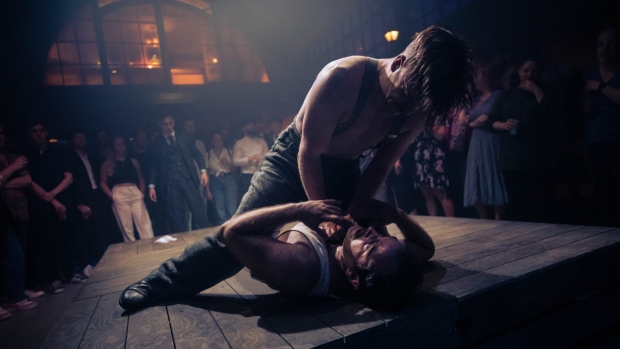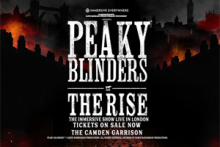”Peaky Blinders: The Rise” at Camden Garrison – review

© Mark Senior
The team behind this boldly conceived immersive theatre piece really know their stuff, in terms of referencing and riffing upon the popular TV drama, and also marshalling groups of people around a specially conceived space. That’s not surprising given that director Tom Maller is a Secret Cinema alumnus and staged the long-running Great Gatsby show. However, this is a much more intense, visceral experience than that F Scott Fitzgerald distillation.
The central premise of Peaky Blinders: The Rise is that criminal kingpin Tommy Sheldon (Craig Hamilton, charismatic, witty, dangerous, and a satisfying doppelgänger for Cillian Murphy) has moved his entire operation down the Grand Union canal from Birmingham to Camden to “take London”. Hamilton’s Tommy gets a hell of a first entrance, swaggering the length of the playing space amidst pyrotechnics, chanting and the rest of the cast bashing makeshift percussion to the backing of a thunderous musical score.
The specially created venue, in the heart of Camden Market, is immaculately curated, and pretty spectacular (Rebecca Brower is the designer and the moody, transformative lighting is by Terry Cooke): actors glower down from gantries, lurk menacingly in the shadows, or raucously serenade the assembled throng from atop saloon bars, and there is a sense of palpable unease, as though something nasty could kick off at a moment’s notice.
Initially, Katie Lyons’ script seems like a load of shouting and bawling but stick with it as a story does emerge and, in fact, the show is more plot-driven than most other immersive pieces. This one has a definite beginning, middle and end, and the audiences are corralled into the large spaces of Rebecca Brower’s astonishing set design to ensure that major incidents are not missed, even if pieces of vital information don’t always make it through the rollicking chaos.
The premise is new but the characters, recurring motifs and atmosphere of suppressed viciousness will be immediately familiar to the many fans of Steven Knight’s original creation. So will the accurately realised post-WW1 period feel juxtaposed with banging contemporary pop and rock tunes. This is a boisterous good time, as long as you’re prepared to throw yourself into it. Personally, I reached my threshold of being manhandled and yelled at fairly early in the evening, but others were clearly loving it.
When several things are happening at once, the sound bleeds quite noticeably between scenes making it difficult to hear the performers, which can get a little confusing, not to say downright exhausting. In general though, the declaratory acting style works just fine – nobody is going to go to a Peaky Blinders promenade performance expecting much in the way of nuance – and a couple of the players make satisfyingly vivid impressions, particularly James Bryant’s wonderfully vulgar Al Capone and Kieran Mortell’s unsettling, drunkenly violent Arthur Shelby. It’s hard to imagine anybody matching the late Helen McCrory’s unique combination of toughness and glamour as Polly Gray, but Emma Stansfield cuts a majestic figure.
The singing is excellent throughout, and that of Roxana Bartle’s ethereally beautiful heartbreaker Grace Burgess, the woman who broke Tommy Sheldon’s heart, is world-class. If you can get into the larger performance space when she delivers an impromptu set of heartache numbers, I’d strongly recommend doing so.
Stuart Boother’s fight direction is another remarkable aspect of the production. Violence viewed at such close quarters can so easily appear choreographed but here it seems raw and real, especially a climactic bare-knuckle fight near the show’s conclusion.
Ultimately this is a rambunctious, often exciting and occasionally unsettling combination of bombastic sound and visuals and larger-than-life performances that will undoubtedly delight fans of the TV series. It may prove bewildering for everybody else, but they’re just not cut out to be part of Tommy’s “family”. If you’re a drinker, a couple of beverages will definitely help.













